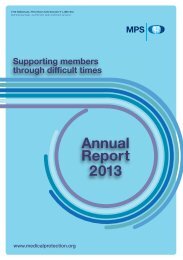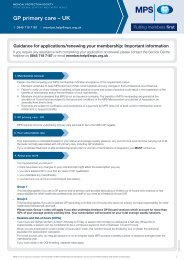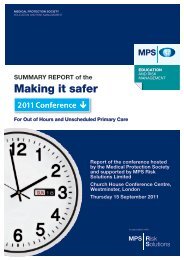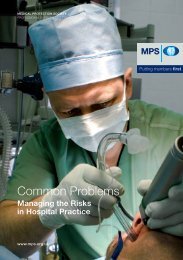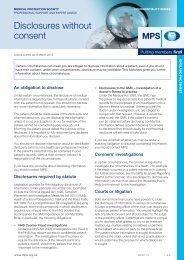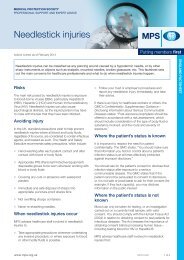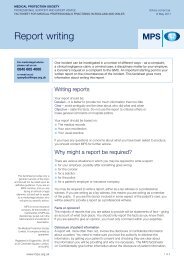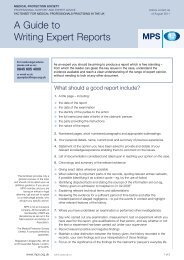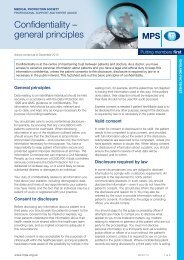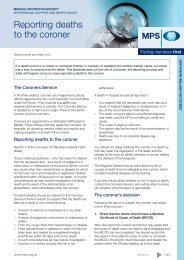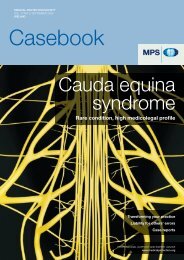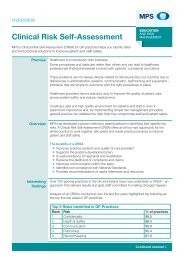Dr Rob Hendry - Medical Protection Society
Dr Rob Hendry - Medical Protection Society
Dr Rob Hendry - Medical Protection Society
Create successful ePaper yourself
Turn your PDF publications into a flip-book with our unique Google optimized e-Paper software.
22<br />
CASE REPORTS ENT CONSENT/COMPETENCE<br />
UNITED KINGDOM CASEBOOK | VOLUME 19 | ISSUE 1 | JANUARY 2011 www.mps.org.uk<br />
Inappropriate delegation<br />
Mrs R, a 42-yearold<br />
amateur<br />
opera singer, was<br />
admitted for an elective<br />
partial thyroidectomy under<br />
ENT consultant, Mr F. Mrs<br />
R was admitted by <strong>Dr</strong> A,<br />
a junior surgical doctor.<br />
He recorded that she<br />
was having the operation<br />
because she had declined<br />
radioactive iodine treatment<br />
of her hyperthyroidism. Once<br />
he finished the history and<br />
examination, <strong>Dr</strong> A informed<br />
Mrs R that a more senior<br />
doctor would go through<br />
the consent form with her<br />
at some point during the<br />
day. On this particular day,<br />
however, there was a very<br />
long and busy surgical list,<br />
and Mr F did not get the<br />
chance to complete the<br />
consent form with Mrs R.<br />
Neither did he go through<br />
the form on his brief review<br />
of Mrs R on the ward<br />
round the next morning.<br />
When Mrs R arrived in<br />
the anaesthetic room, <strong>Dr</strong><br />
A went through her notes.<br />
Realising that the consent<br />
form was still missing,<br />
<strong>Dr</strong> A went through to the<br />
operating theatre to discuss<br />
the matter with Mr F. Mr F<br />
was in the middle of another<br />
procedure and told <strong>Dr</strong> A<br />
to take Mrs R’s consent<br />
for the thyroidectomy and<br />
file it in her notes. Feeling<br />
a bit intimidated, <strong>Dr</strong> A<br />
agreed and went back into<br />
the anaesthetic room.<br />
Anxious at <strong>Dr</strong> A’s<br />
hesitancy, Mrs R asked if<br />
anything was wrong. <strong>Dr</strong><br />
A reassured Mrs R and<br />
explained that there had<br />
been a little confusion<br />
because a consent form for<br />
the operation had not yet<br />
been signed, and he asked<br />
if he could go through that<br />
process with her. Mrs R<br />
agreed and <strong>Dr</strong> A described<br />
what her operation would<br />
involve. A written information<br />
leaflet was not available<br />
but <strong>Dr</strong> A asked Mrs R if<br />
she had any questions<br />
about the procedure and<br />
Mrs R answered no. Both<br />
Mrs R and <strong>Dr</strong> A then<br />
signed the consent form.<br />
After the operation, Mrs R<br />
experienced typical postthyroidectomy<br />
side effects,<br />
including discomfort on<br />
swallowing, hoarseness,<br />
neck stiffness, bruising and<br />
swelling. The team assured<br />
her that this was a usual<br />
response and offered her<br />
appropriate analgesia.<br />
LEARNING POINTS<br />
Two days after her<br />
operation, Mrs R’s pain<br />
and swelling had reduced<br />
and she was discharged<br />
home after being told<br />
that the post-surgical<br />
hoarseness should settle<br />
in the next few weeks.<br />
Four weeks later, Mrs R<br />
saw Mr F in his outpatient<br />
clinic for routine wound<br />
review and thyroid function<br />
test. Mrs R commented<br />
that although her neck was<br />
healing well, the hoarseness<br />
had not improved since the<br />
operation and, concerned<br />
about her singing voice,<br />
she asked him how long it<br />
would be before this was<br />
resolved. Mr F told her that<br />
permanent hoarseness<br />
is a rare complication of<br />
thyroidectomy and arranged<br />
to review her again in<br />
another four weeks.<br />
At that review, there<br />
was still no improvement<br />
and Mr F diagnosed<br />
permanent damage to the<br />
recurrent laryngeal nerve.<br />
Mrs R started a claim<br />
against both Mr F and<br />
<strong>Dr</strong> A for not warning her<br />
that this could happen.<br />
EXPERT OPINION<br />
Expert ENT opinion<br />
was critical of Mr F’s<br />
delegation of the task to<br />
<strong>Dr</strong> A. Although he was<br />
not directly accountable<br />
for the decisions and<br />
actions of <strong>Dr</strong> A, he was still<br />
responsible for the overall<br />
management of the patient,<br />
and accountable for the<br />
decision to delegate.<br />
Mr F claimed that he had<br />
spoken to Mrs R about the<br />
procedure at a previous<br />
consultation, but there<br />
was no record of this. <strong>Dr</strong><br />
A should have refused<br />
to take consent, on the<br />
basis that it was outside<br />
his field of competence.<br />
The claim was settled<br />
for a moderate amount.<br />
SM<br />
■ All doctors have a duty to ensure that they have the necessary understanding of a<br />
procedure to take consent. If not, ensure that consent is taken by someone who does.<br />
■ It is important not to practise beyond your skills and expertise.<br />
■ When delegating care or treatment, you must be satisfied that the person to whom<br />
you are delegating has the appropriate experience, qualifications, knowledge and<br />
skills to provide the care.<br />
■ Written consent is essential for surgical procedures – except emergencies – and<br />
patients need to be informed of relevant side effects and complications.<br />
■ Record any discussion of possible complications in the notes, even if this discussion<br />
takes place outside the formal consenting process.<br />
■ A patient information leaflet is a useful adjunct to have but does not replace the<br />
discussion about risks and side effects.<br />
Stepan Popov/iStockphoto.com



